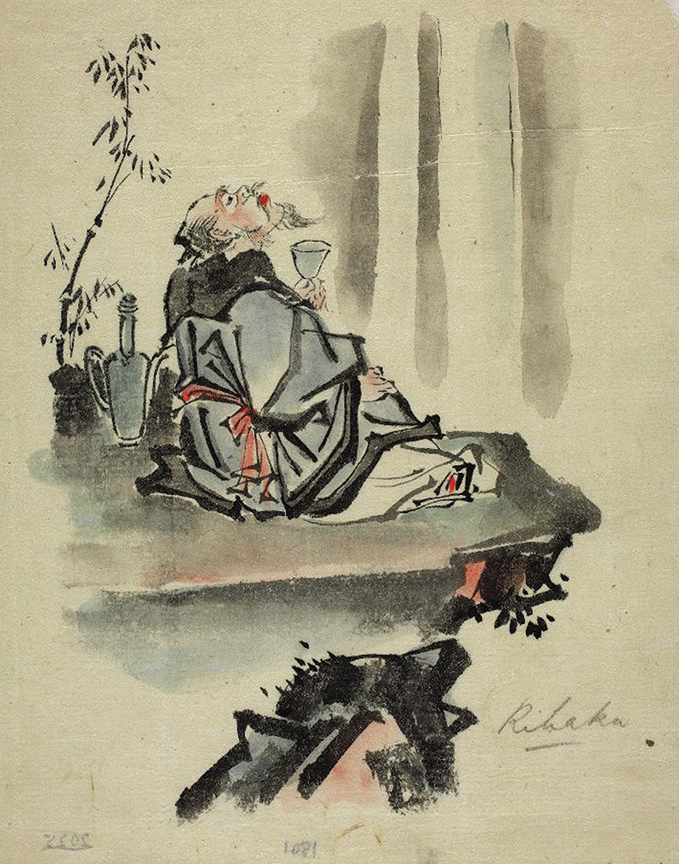Browsing through an anthology of classical Chinese poetry the other day, I happened upon a lyric by Li Po entitled “Drinking Alone beneath the Moon.” At the risk of reducing expansive literature to a single interpretation, we might say that the poem is a paean to the power of alcohol—to understanding alcohol as a tool that can help relax ego consciousness and facilitate a kind of selfless merger with nature, Tao, reality, the ineffable ground of our collective existence. According to the tipsy author: “Three cups and I’ve plumbed the great Way, / a jarful and I’ve merged with occurrence / appearing of itself ” (trans. David Hinton).
This tradition of incorporating wine into a meditative practice concerned with seeing through separation is just that: a tradition. Li Po’s buzz reminds me of the influential poet T’ao Ch’ien (365–427) and his habit of lounging on a special “drinking rock” beside a waterfall. Are T’ao Ch’ien’s verses about humanity’s place within some larger flow those of a sloppy drunkard, a rowdy frat boy (no offense, fellas) on a Saturday night? Hardly. They are gentle, quiet, rich with an understated wisdom, an elegant philosophy of interconnection. They give boozing a good name.
Generally speaking, notions of alcohol use in American society fit into a few basic categories, each severely limited and limiting. At best, we associate drinking with an exuberant dinner party, family and friends bonding noisily over Chianti. More commonly, though, what comes to mind are Budweiser and Captain Morgan commercials flashing across the television screen: vapid images of partying in the sun, all bikinis and crushed ice. Of course, there’s also the grim fact of alcoholism.
What happened to controlled, contemplative tippling? What happened to the ancient art of imbibing not just a can of suds but the organic unfolding and refolding of the physical universe—drifty clouds, scampering squirrels, flower-perfumed breezes? What happened to alcohol as catalyst, as a nudge to get the ball rolling, the ball named “Me” that occasionally picks up speed and jounces along and disappears into the ravine at the bottom of the forested hill, the wild gulch where mosses and frogs and pebbles reside?
I spend the bulk of most Sunday afternoons hiking around on said forested hill. Actually, “hiking” is a tad misleading, as I tend to bushwhack away from the trail, find myself a little clearing or cozy thicket, and then just sit on a random log. Often I bring two strong beers along, IPAs that help me slow down and gaze deep into the woven world, the ecosystem of layer and texture and incredible detail that I know myself to be part of but rarely feel myself immersed within. They’re like sandpaper, these tasty brews, smoothing away the grit of my so-called identity (fantasies, memories, Budweiser jingles), rendering me just another common piece of the landscape.
Well, maybe on a good Sunday. Unlike Li Po, I can’t say that I’ve ever successfully “plumbed the great Way.” I’ve witnessed some things, that’s all: chickadees flitting among golden leaves, for instance, or those leaves falling, waffling to the ground, then rising on a gentle gust before falling a second time. At my moments of fullest stillness, I’ve flitted with the chickadees, fallen with the leaves, forgotten where “I” ends and “not-I” begins.
Here, I’ll put it differently: after a while on that log, my butt goes numb. I lose sensation, lose touch with . . . myself? It may sound funny—I’d be the first to admit that this is a silly, beery thought—but my meditative practice these days involves, essentially, apprenticing mind to behind. Letting awareness press up against the chickadees and leaves as my rear does the woody seat: this is the goal.
A beery thought indeed! But maybe that’s not a bad thing. We use the word “sober” to refer to a rational, logical, Western view of the earth, a view that insists humans are isolated from birds and leaves and logs; but an overabundance of sobriety impedes the possibility of merger, doesn’t it? Chickadees it. Golden leaves fall, rise, fall again. I tilt the bottle, wait for a last drop to slide into my mouth. As Li Po says, “you can’t preach doctrine to the sober.”
Then again, that’s coming from a guy who, according to legend, got drunk in a boat one night, reached out to hug the moon’s reflection, and consequently drowned in its glowing white embrace. Alcohol is an intoxicant—period. Never operate machinery while under the influence. And when attempting to merge with the ineffable ground of our collective existence, please do so responsibly.
Thank you for subscribing to Tricycle! As a nonprofit, we depend on readers like you to keep Buddhist teachings and practices widely available.
